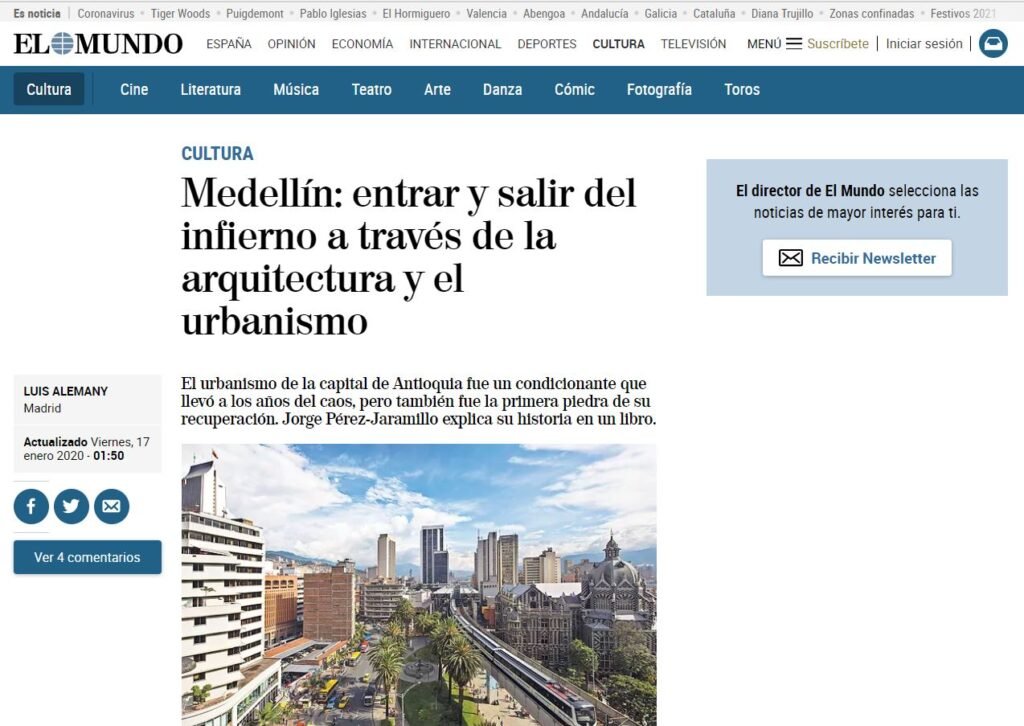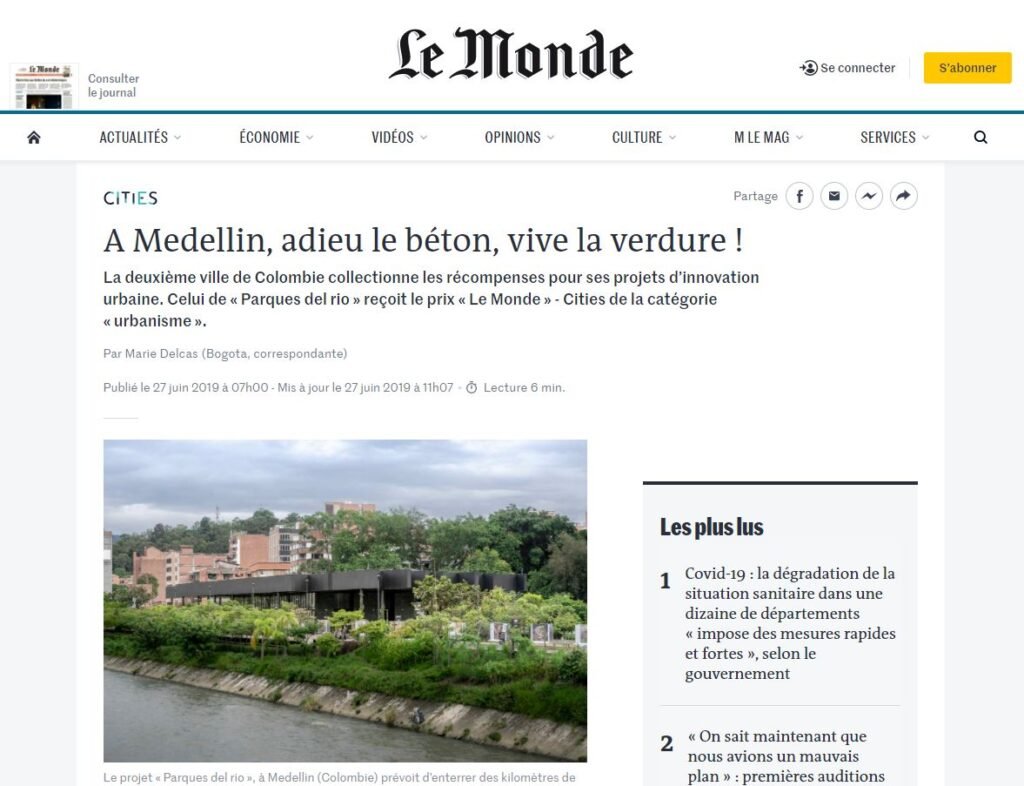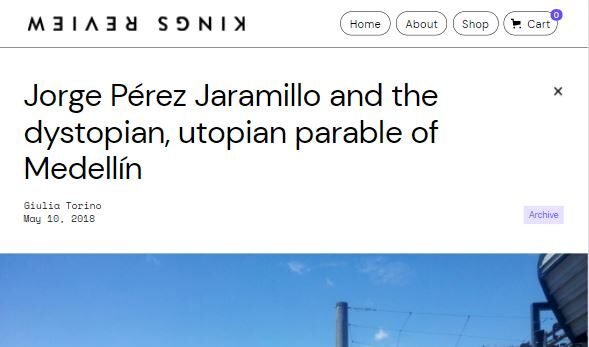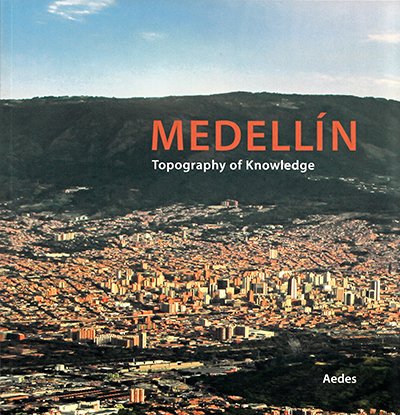MEDELLÍN
SCENARIO OF TRANSFORMATION
Medellín in the media
PARQUES DEL RÍO (Medellín)
Proyecto seleccionado #27BIENALSCA
Medellín in Paris
Doris Tarchópulos
urbam EAFIT Research Group - Medellín: Two stories of transformation
Medellín in the Seoul Biennale 2017 -
Seoul International Biennale on Architecture and Urbanism
PARQUES DEL RÍO MEDELLÍN - por Sebastian Monsalve Gómez - Lecciones de Arquitectura
University College London Sustainable Urban Mobility -
Medellín, Parques del Río
Lee Kuan Yew World City Prize 2016 Laureate: Medellín
How Cities Make Us Sick
Rediseñando las ciudades para la gente
Panels and academic talks
Pertanto LIVE Conversations
Medellín: Urbanismo y sociedad
16 de marzo de 2022
CONFERENCIA MEJORES CIUDADES
Arquitectura-Sociedad-Ciudad en Medellín
Universidad del Valle
22 de abril de 2021
#54 Gobernanza metropolitana desde la experiencia de Medellín - Económicas UBA
Universidad de Barcelona
10 de octubre de 2021
AQUÍ Y AHORA - ESPACIO DE ARQUITECTOS
Interview with Jorge Pérez Jaramillo
Argentina
3 de septiembre de 2020
Panel on social urbanism -
Decolonizing Design Lecture Series
Florida International University
14 de octubre de 2020
Teleproyecto Nº 1331 - Arq. Jorge Pérez Jaramillo, aguda mirada sobre el Medellín actual
Argentina
12 de julio de 2018
Medellín in publications
Globally, cities are the source of over 70 percent of the world’s greenhouse gas emissions. Cities are also the engines of the global economy, concentrating more than half the world’s population, and they are where the middle class is rapidly expanding. Often urban policymakers prescribe integration as the solution to steering urbanization towards decarbonization to achieve greater global and local environmental benefits. However, little is known about the struggles—and successes—that cities in developing countries have in planning, financing, and implementing integrated urban solutions. The main objective of this report is to understand how a variety of developing and emerging economies are successfully utilizing horizontal integration—across multiple infrastructure sectors and systems—at the metropolitan scale to deliver greater sustainability. This report explores how integrated planning processes extending well beyond city boundaries have been financed and implemented in a diverse group of metropolitan areas. From this analysis, the report derives models, poses guiding questions, and presents three key principles to provoke and inspire action by cities around the world.
El libro reúne los trabajos presentados por los conferencistas del Seminario Internacional Políticas Habitacionales vigentes en América Latina y España, organizado por la Maestría en Gestión y Desarrollo de la Vivienda Social (MGDVS) de la Facultad de Arquitectura y Urbanismo de la Universidad Nacional del Nordeste, los días 7 y 8 de mayo de 2018, en la ciudad de Resistencia, Chaco, Argentina
Las conferencias aportan un panorama general de la Política Habitacional de Uruguay, Colombia, Argentina, España, Chile y Brasil, mostrando diversidad de situaciones entre los países, pero también algunas semejanzas que visibilizan tendencias en las orientaciones de las políticas y de los organismos de préstamo, así como las estrategias desarrolladas a lo largo de los años. La organización del seminario y la compilación de los trabajos presentados estuvo a cargo del Equipo de Dirección de la Segunda Edición de la MGDVS: Laura Alcalá, María Bernabela Pelli y Marta Giró.
This document wants to achieve the significance of a testament. To attest is to leave a legacy; it is also to record the fundamental points of view of a thought. Beyond recording the Parques del Río Medellín megaproject, the origins of the initiative, its vicissitudes and its implementation, it is intended to lay the foundations of a possible, necessary and desired city model.
Model that starts from and is inspired by the current change of perspective of cities in front of their rivers and that implies unleashing initiatives to return to them from the materialization of large infrastructure works that specify a harmonious relationship between the city and its natural tributary , by recovering their sense of life line and structuring axis of the territory.
Medellín in books
In the past three decades, Medellín has faced one of the most violent crises in Latin America. As a consequence, the city experienced a social decline that was reflected in its urban planning. Faced with this scenario, in a relatively short term, Medellín built a path to evolve, reach conditions of viability and improve quality of life indicators, therefore it represents an example worth analyzing. This book takes us on a journey in which we can observe the evolution of the city, through a broad and diverse social, participatory and inclusive process, based on collective leadership.
Medellín provides multiple elements for the analysis from a little-known and novel perspective. It reflects the foundations of the process from a personal and experimental vision, as well as the author's critical study that is contrasted with documented facts and evidence about urban reality.
Taking a closer look at contemporary practices in the architecture and urban planning of Latin America, Aedes Architecture Forum in Berlin explores the forms of knowledge creating in Medellín, Colombia through a comprehensive insight of a twenty-five years recovery. Following the last Aedes exhibitions about urban spatial practice in Latin America of “Paraísópolis, São Paulo“, “Downtown Bogotá, My Ideal City” and “Torre David, Informal Vertical Communities”, Aedes returns to South America to learn from a city that transforms knowledge and skill into a vision for social equality and prosperity.
Celebrated as the most “Innovative City 2013” by the Wall Street Journal and the Urban Land Institute, Medellín is the quintessential symbol for urban metamorphosis. In May this year the city won first price in the Global Holcim Award 2015, for the transformation of a water reservoir into a public park. What makes this a reference model lies as much in its exceptional public facilities and infrastructure, as in the city’s socially driven, progressive urban policies and bold formats for cooperation. “Medellín: Topography of Knowledge” is an exhibition and programme that will investigate and disseminate lessons from the Medellín Model, bringing together the diverse range of actors behind it.






